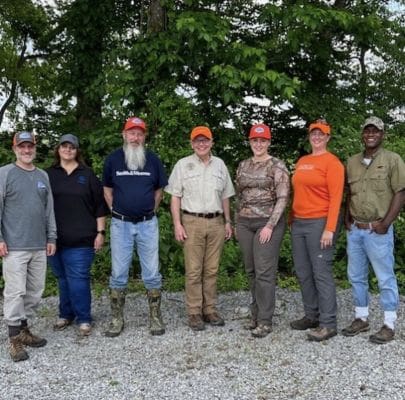The beforehand quiet governance of fish and wildlife is being shaken by the arrival of partisan politics and brokers of cultural change
Moreover being a dad and a husband, my most consequential job was serving as a member of the Montana Fish and Wildlife Fee. My time period didn’t final lengthy; my appointment wasn’t confirmed by the state’s Senate, however in the course of the time I served, I fortunately accepted the load and accountability of the unpaid place.
I spent late nights reviewing biologists’ justifications for big-game season modifications. I obtained a whole bunch of public feedback, generally throughout these late nights, and tried to reply to all I might. I toured actual property acquisitions with hunters and wildlife managers. I helped translocate bighorn sheep. When casting votes I attempted to be a good advocate for not solely Montana’s fish and wildlife assets however for my neighbors, whether or not they hunted or fished or farmed or just favored to look at birds and wildlife.
Though politics was at all times simply off-stage — and it was politics that finally tanked my service — I by no means felt that affect, both from partisan politicians or curiosity teams, coloured my votes or compromised my opinion of a subject.
In that regard, I could also be one of many final of the unaligned wildlife commissioners within the West, and probably the entire nation. Since I left the place 4 years in the past, one of many developments to emerge in wildlife administration is the polarization and politicization of wildlife commissions, with single-issue appointees and commissioners who’re positioned on boards to make sure a strategic final result.
The appointment of what I’d name activist commissioners has turned fish-and-wildlife administration on its head in some states, and has compelled a reassessment of the position of commissions, which for many years have been quiet backwaters of collegiality.
STATE SKIRMISHES
Exhibit A is Washington, the place the state’s wildlife fee has a latest majority of members fascinated with quickly increasing the mandate of the fish and wildlife division from one which primarily serves hunters and anglers to at least one that locations equal weight on all fish and wildlife assets, together with people who aren’t hunted or fished. As a result of hunters and anglers historically have paid for many useful resource administration, they’ve had disproportionate affect over the fee. As that’s modified, fee conferences have grow to be arenas the place opposing sides debate every little thing from “woke-ism” to cultural bigotry, with fish-and-wildlife administration talked about generally as an afterthought.
In Colorado earlier this 12 months, the state Senate narrowly confirmed an animal rights lawyer to the Colorado Parks and Wildlife Fee, the physique that governs the state’s wildlife-management company. Vermont lawmakers, responding to strain so as to add extra non-hunters to the state’s Fish & Wildlife Board, practically overturned a century of custom in March after they thought of eradicating rule-making authority from the legislature and giving it to the commissioner of Fish & Wildlife.
In Kansas, the conservative state legislature handed a legislation earlier this 12 months that requires wildlife commissioners to be appointed by elected officers, together with occasion leaders of the state’s Home and Senate.
In Kentucky, a Senate invoice filed in the course of the 2024 legislative session would have transferred authority from the governor to the elected Commissioner of Agriculture for appointing Fish and Wildlife Fee members. Finally the invoice was not taken up for motion by the state’s Normal Meeting.
NO LONGER JUST HUNTING AND FISHING
On the core of all these modifications is a shift in public values of wildlife. An influential research of People’ wildlife values revealed in 2018 discovered the proportion of residents who describe themselves as “mutualists,” believing that people and wildlife are supposed to co-exist, was totally 35 p.c of the inhabitants. In the meantime 28 p.c of People outline themselves as “traditionalists,” believing that wildlife is a useful resource that must be managed for the good thing about folks. Twenty-one p.c outlined themselves as “mutualists,” holding beliefs that share traditionalist and mutualist values, and 15 p.c of People are what’s outlined as wildlife “distanced,” that means that they not often work together with nature or develop beliefs round wildlife administration.
Pattern traces counsel that the proportion of mutualists is on the rise nationally whereas the proportion of traditionalists is declining. That appears to sq. with different information that counsel the normal constituency of fish-and-game companies — hunters and anglers — is changing into much less quite a few, influential, and related over time as Child Boomers age out of the inhabitants.
In the meantime, the administration mandates of natural-resource companies is growing, as they’re tasked with overseeing non-game fish and wildlife species in an period of habitat transition, in addition to managing a diversifying group of out of doors recreationists, from mountain bikers and birdwatchers to foragers and floaters.
Political leaders, recognizing that fish-and-wildlife commissioners could make long-lasting useful resource selections exterior the legislative enviornment, are more and more putting in activist commissioners who’re in some circumstances accelerating the transition from conventional wildlife administration and in different circumstances doubling down on conventional hook-and-bullet administration.
Whether or not one or the opposite prevails might rely upon who sits on fish-and-wildlife commissions, and the way extensively or narrowly they view their constituencies.
Concerning the Out of doors Trade Communication Council
Shaped across the dedication to teach all People in regards to the origins of conservation funding in America, the Out of doors Trade Communication Council is powered by way of a multi-state conservation grant and represented by corporations, wildlife companies, skilled communicators, and conservation organizations. This challenge is funded by the Multistate Conservation Grant Program (F23AP00404), supported with funds from the Wildlife and Sport Fish Restoration Program and collectively managed by the Affiliation of Fish and Wildlife Companies and the U.S. Fish and Wildlife Service.





